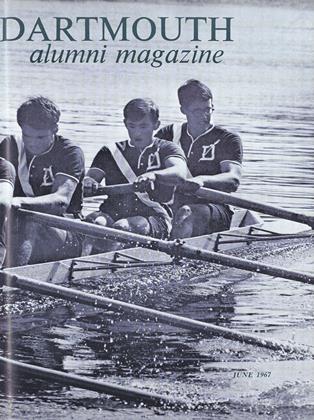LISLE C. CARTER '45 talks softly and carries big scissors. He needs them to cut across Federal agency and program lines to accomplish his jobs as Assistant Secretary in the Department of Health, Education and Welfare and Director of the Center for Community Planning.
"I carry two portfolios," says Carter, a Presidential appointee. The Assistant Secretary's job he describes as "involving the 'W' part of HEW." He is responsible for individual and family services which encompass problems of social security, vocational rehabilitation, welfare, and aging. He bears overall accountability for HEW activities in juvenile delinquency and youth development, antipoverty program coordination, mental retardation and the handicapped, migratory labor, urban assistance, rural development, and the care of refugees and immigrants.
The Community Center Director's job embraces relatively new thinking about urban problems and the concept of the Model Cities Program, established under the Demonstration Cities and Metropolitan Development Act of 1966.
Carter relates the hypothesis to Watts: "You can say there were no jobs in Watts, yet there were jobs in Los Angeles County. But in addition to the need for job training there were needs for transportation or for housing which would provide closer access to jobs.
"What I mean is that you can't arbitrarily separate the physical and environmental from the social and educational."
In this portfolio the emphasis is on coordination. Or as HEW Secretary John Gardner put it: "As we attack the blight of city ghettos, project planning must link education, land use, transportation, recreation, health care, social services, and construction in a total program for human betterment."
It seems an overwhelming job for one man, but the deceptively calm Carter is admirably experienced to meet its demands. "Most of the problems aren't new," he says. "But I'm not sure I had all the right solutions."
Prior to this appointment, in February 1966, he was an assistant to Sargent Shriver in charge of Federal interagency relations for the Office of Economic Opportunity and before that was HEW Deputy Assistant Secretary. In that capacity he headed a group that devised regulations for compliance with Title VI of the Civil Rights Act of 1964 which is concerned with racial discrimination by state agencies receiving Federal funds.
Carter was legal counsel for the National Urban League from 1956 to 1961 and was Executive Director of the Washington, D. C., Urban League from 1954 to 1956.
At St. John's University Law School, which he attended after Army service in World War 11, he was the first of his race to be accorded membership in Phi Delta Phi, an international legal fraternity. He was in private practice in New York for about ten years.
He has a special interest in juvenile delinquency and was a member of the New York City Board of Correction from 1957 to 1961. His present job is administrative at the expense of some of the personal contacts he prefers, but he tries to talk with people in communities to "get at the problem."
"More money isn't the only answer," Carter says. "We need to do more about adapting different Government department functions to meet modern essentials. It's my job to find ways of making the Government more responsive to local needs."
 View Full Issue
View Full Issue
More From This Issue
-
 Feature
FeatureProphecy in Painting
June 1967 By ROBERT REID and DOROTHY BECK -
 Feature
FeatureThe Wallace Affair
June 1967 By C.E.W. -
 Feature
FeatureRETIRING FACULTY
June 1967 -
 Feature
FeatureAN ATHLETIC SUMMING UP
June 1967 By CLIFFORD L. JORDAN '45 -
 Class Notes
Class Notes1959
June 1967 By RICHARD G. JAEGER, JAMES W. WOOSTER -
 Article
ArticleThe Undergraduate Chair
June 1967 By ART HAUPT '67
Article
-
 Article
ArticlePerhaps the shortest
April 1926 -
 Article
ArticlePerley Bugbee '90 Dies
November 1935 -
 Article
ArticleA Wah Hoo Wah for –
MARCH 1963 -
 Article
ArticleAn Unusual Trio of First Novels
MAY 1996 -
 Article
ArticleRoller Skates Take to the Woods
MARCH 1994 By Ericka Houck '93 -
 Article
Article"We Dare Not Default"
July 1951 By RICHARD C. PUGH '51

